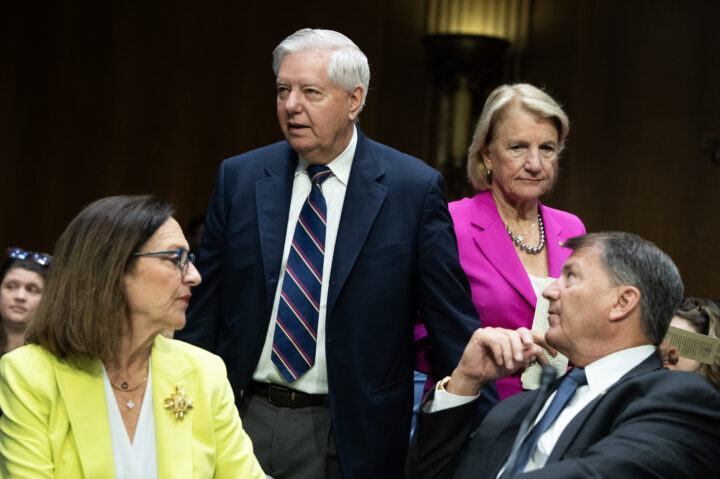The bill includes a total of $80 million in additional funding, as compared to 2025, for several cooperative programs with Israel

Tom Williams/CQ-Roll Call, Inc via Getty Images
From left, Sens. Deb Fischer, R-Neb., Lindsey Graham, R-S.C., Shelley Moore Capito, R-W.Va., and Mike Rounds, R-S.D., attend the Senate Appropriations Committee markup of the "Department of Defense Appropriations Act, and the Departments of Labor, Health and Human Services, Education, and Related Agencies Appropriations Act," in Dirksen building on Thursday, July 31, 2025.
The Senate Appropriations Committee’s draft 2026 defense funding bill, approved by a broad bipartisan committee vote on Thursday, includes increases to several U.S.-Israel cooperative defense programs.
The bill includes a total of $80 million in additional funding, as compared to 2025, for several cooperative programs with Israel. It offers a total of $75 million for counter drone and missile programs, $47.5 million for cooperative programs in emerging defense technologies like artificial intelligence and $80 million for counter-tunneling programs, according to a summary released by the committee.
The bill includes $500 million for cooperative missile defense programs including Iron Dome, David’s Sling and Arrow provided annually under the terms of the U.S.-Israel memorandum of understanding.
It also offers additional security assistance funding for Bahrain and Jordan.
The committee debated and rejected two amendments by Democrats addressing the administration’s plans to retrofit a gifted Qatari jumbo jet to serve as Air Force One.
Sen. Jeanne Shaheen’s (D-NH) amendment would have prohibited funding to modify or operate the Qatari jet, highlighting security and corruption concerns about the gift; the unclear costs and timeline associated with the retrofit; and comments by the secretary of the Air Force indicating that the administration plans to pull funding from a nuclear missile program to fund the overhaul.
Recent reports suggest that renovations could cost close to $1 billion.
“This jet was just delivered to the Department of Defense. We need to have a classified briefing to understand any proposed modifications and the risk of not applying them,” Sen. Mitch McConnell (R-KY) responded, opposing the amendment. “The aircraft timeline is such that it’s not going to be modified with fiscal [year] [20]26 dollars in any event, making this a poison pill political amendment better suited for the [National Defense Authorization Act].”
President Donald Trump said that the plane could make its first flight in February.
Shaheen withdrew the amendment due to Republican comments that the amendment would kill the defense spending bill.
Sen. Chris Murphy (D-CT) offered a more limited amendment that would have blocked the administration from transferring the plane to a private entity before the end of its useful life, an attempt to head off reported plans to transfer the plane, after Trump’s term, to his presidential library, potentially for his personal use, after his presidency.
Republicans again argued that a full briefing is necessary on the administration’s plans before making any such moves, and that the amendment would kill the defense spending bill.
“To address this claim that’s been made a few times that this is a poison pill, if I understand correctly, that means that the Senate would refuse to fund the Pentagon unless it allows the president to accept a jet from a foreign prince. If that’s true, I’d like to understand why that is the line in the sand that would be drawn,” Sen. Jon Ossoff (D-GA) responded. “The only other argument that I can conceive is that we think the President would veto the entire Pentagon budget unless he’s able to accept a jet from a foreign prince. I’d like to see him make that argument to the American public.”
The committee rejected the Murphy amendment by a party line vote.
Sen. Lisa Murkowski said she opposed the two amendments to ensure the bill as a whole could still pass, but said, “I don’t want my ‘no’ vote to be assumed that I’m OK with where we are with this transfer, that I’m OK not knowing the numbers behind it, that I am perhaps OK with the appearances — because I have concerns about them.”
The Senate bill would provide billions in additional funding for air and missile defense systems and to replenish U.S. stockpiles of air defense interceptors, which saw heavy use during the recent war in Gaza.
“Recent operations in the Middle East illustrate how quickly modern warfare can exhaust our arsenal of critical [interceptor] munitions,” McConnell, who chairs the Defense Subcommittee, said. “The administration’s request did not fully maximize production capacity for certain critical munitions.”
“We made lots of improvements in the [administration’s] request given the challenges with missile stockpiles that we’re seeing in Ukraine and the Middle East,” Sen. Chris Coons (D-DE), the subcommittee ranking member, said. “I can’t explain why the administration didn’t propose to buy every single missile it could on existing production lines and expand others, but it didn’t.”
Generally, lawmakers on both sides of the aisle argued that the administration’s defense funding request was too low, and agreed on a bipartisan basis to propose providing $852.5 billion, 2.6% or nearly $22 billion above the administration’s request and the House’s draft of the bill, which the lower chamber approved last month.






























































